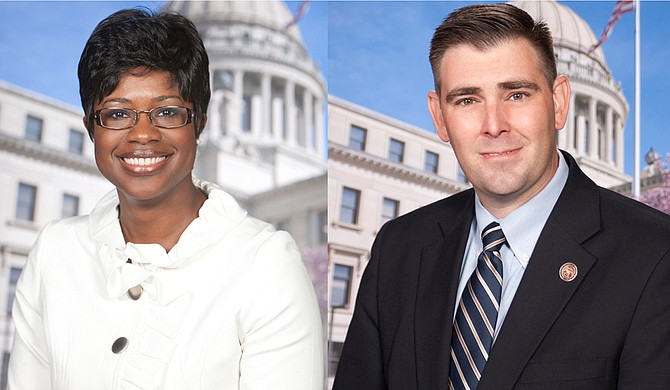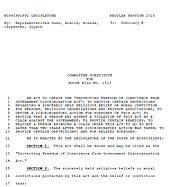Rep. Adrienne Wooten, D-Ridgeland (left), argued against the “Mississippi Church Protection Act,” asking Rep. Andy Gipson, R-Braxton (right), how many instances of violence have occurred in Mississippi; Gipson had no answer. Photo courtesy Mississippi Legislature
The deepest fears of some members of the Mississippi House of Representatives came out last week, as the chamber passed bills to fight terrorism, protect religious freedom and allow armed security programs in churches.
Tuesday was the deadline for bills to make it out of committee because the session is shorter by two weeks this year. School consolidation, unemployment tax rates and breastfeeding bills made it onto the calendar in the Senate and the House.
Anti-LGBT Bill Sails Through House
State employees could be recused from performing their governmental duties if those duties go against their religious belief that marriage is between one man and one woman if legislation that passed through the House last week becomes law.
Kim Davis, a circuit clerk in Kentucky who went to jail for not issuing same-sex marriage licenses, would not go to jail in Mississippi if the bill becomes law.
The legislation defines marriage as a union between one man and one woman, last week. The bill, called the "Protecting Freedom of Conscience from Government Discrimination Act," also defines and protects religious beliefs that say sexual relations are properly reserved to that marriage; and male/female refer to an individual's immutable biological sex determined at birth.
Several Democrats voiced concerns about the bill, which would protect some individuals while allowing discrimination against LGBT citizens. Rep. Adrienne Wooten, D-Ridgeland, said a part of the bill would actually allow discrimination without any state government interference. The bill says, "[T]he state government shall not take any discriminatory action against a state employee ... on the basis that such employee lawfully speaks or engages in expressive conduct based upon ... a sincerely held religious belief or moral conviction."
"Why are you giving people a pass for doing their governmental duty?" Wooten asked the chamber.
Rep. Andy Gipson, R-Braxton, who presented the bill on the floor, said it "provides a layer of protection against state discrimination" for individuals and state government employee, who do not want to perform certain government duties that go against their religious beliefs—or beliefs that conflict with the Obergefell U.S. Supreme Court ruling last June that legalized same-sex marriage nationally. Gipson said the bill protects individuals' right to believe that marriage is between one man and one woman.
Sarah Warbelow, legal director at the Human Rights Campaign, said the bill takes elements of several pieces of legislation, including the First Amendment Defense Act, and brings them altogether to look on its face like a religious liberty act, which she said is an important American value.
"This doesn't advance American religious liberty—it allows people to discriminate against LGBT people and hide behind religion to do so," Warbelow told the Jackson Free Press.
Warbelow said the bill offers more authority to religious institutions than they should have constitutionally. Gipson said circuit clerks and judges in the state have asked for this legislation.
"This is not undoing, avoiding or trying to roll back what the Supreme Court said (in Obergefell)," Gipson said. "At the same time, there's a competing right under the First Amendment to worship and believe what we believe without government interference."
House Speaker Philip Gunn originally filed House Bill 1523, and on Friday, the House passed the bill on a vote of 80-39 but was held on a motion to reconsider.
Anti-Terror and Guns in Churches
The "Mississippi See Something, Say Something Act" passed through the House last Tuesday. It would provide civil and criminal immunity for a person who "in good faith" reports "behavior that the person reasonably believes relates to an act of terrorism." If the bill becomes law, a person who reports "suspicious activity or behavior" to a state or local law enforcement officer or state employee will be immune from any civil or criminal liability that the report could cause.
Church members could bring guns to church as a part of a "security program" if the "Mississippi Church Protection Act", which passed the House last week, becomes law. It would allow churches to create "security programs," consisting of members who have firearms (and permits and training) in order to protect the congregation from attacks, "including resisting any unlawful attempt to kill a member(s) or attendee(s) of such a church or place of worship, or to commit any felony upon any such member."
Rep. Gipson said the legislation was, at least in part, a reaction to what happened in Charleston, S.C., last year when Dylann Roof, a white male, entered a small group meeting at Emanuel African Methodist Episcopal Church and killed nine African American church members.
Several Democrats in the House voiced concern about providing immunity to armed church groups. Rep. Adrienne Wooten, D-Ridgeland, said she worried about creating a law that is not needed in the state.
The bill passed and next goes to the Senate.
Get daily legislative updates at jfp.ms/news and jfpdaily.com. See more at jfp.ms/msleg.



